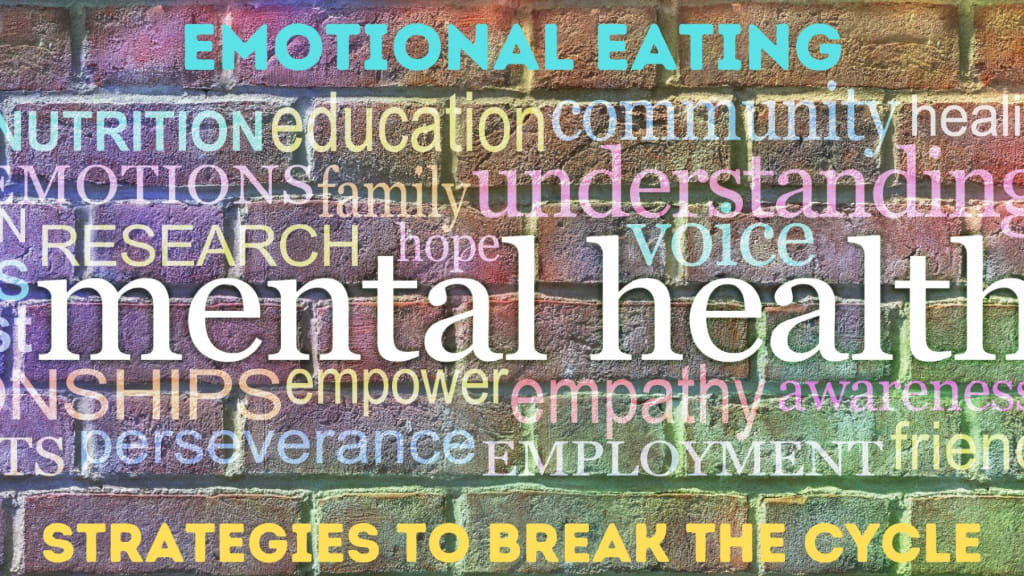Understanding Emotional Eating: Strategies to Break the Cycle and Find Balance
Exploring the Causes of Emotional Eating and Empowering Yourself to Develop Healthy Coping Mechanisms

Emotional eating is a common phenomenon that many people experience at some point in their lives. It refers to the practice of using food as a way to cope with and soothe emotional distress. Whether it's stress, sadness, boredom, or even happiness, turning to food for comfort can become a habit that negatively impacts our physical and emotional well-being. In this article, we delve into the depths of emotional eating, explore its underlying causes, and provide practical strategies to break the cycle and find balance in our relationship with food.
Understanding Emotional Eating:
Emotional eating occurs when we use food as a means to regulate or suppress our emotions. It is often characterized by consuming food in response to specific emotional triggers rather than true physical hunger. Recognizing emotional eating patterns is the first step towards addressing the issue and finding healthier alternatives for emotional nourishment.
Identifying Emotional Triggers:
Identify the emotions and situations that trigger your desire to eat. Are you reaching for food when you're stressed, lonely, or bored? By becoming aware of your emotional triggers, you can start to address the root causes behind your emotional eating habits.
Cultivate Emotional Awareness:
Developing emotional awareness is crucial in breaking the cycle of emotional eating. Take the time to pause and tune into your emotions. Practice mindfulness techniques such as deep breathing, meditation, or journaling to become more attuned to your feelings and thoughts without judgment.
Find Healthy Coping Mechanisms:
Instead of turning to food, explore alternative ways to manage your emotions. Engage in activities that bring you joy and provide emotional comfort, such as practicing yoga, going for a walk in nature, talking to a trusted friend, or engaging in a creative outlet. Find healthy coping mechanisms that nourish your soul without relying on food.
Build a Supportive Network:
Surround yourself with a supportive network of friends, family, or even a therapist who can offer guidance and understanding. Having someone to talk to and lean on during challenging times can help alleviate emotional distress and reduce the tendency to turn to food for comfort.
Mindful Eating:
Practicing mindful eating can help you develop a healthier relationship with food. Slow down and savor each bite, paying attention to the taste, texture, and sensation of the food. Listen to your body's hunger and fullness cues, eating when you're physically hungry and stopping when you're comfortably satisfied.
Create a Nourishing Environment:
Make your home environment conducive to healthy eating habits. Stock your pantry with nutritious foods and minimize the presence of highly processed, sugary snacks. Surround yourself with foods that nourish your body and support your well-being.
Seek Professional Help if Needed:
If emotional eating persists and significantly affects your quality of life, consider seeking help from a registered dietitian, therapist, or counselor who specializes in emotional eating. They can provide guidance, support, and strategies tailored to your specific needs.
Practice Self-Compassion:
Be kind to yourself throughout this journey. Remember that breaking the cycle of emotional eating takes time and effort. Practice self-compassion and self-acceptance, acknowledging that it's okay to make mistakes along the way. Treat yourself with love and understanding as you work towards finding balance and healthier coping mechanisms.
Celebrate Non-Food Rewards:
Find alternative ways to reward and nurture yourself that don't involve food. Treat yourself to a spa day, indulge in a favorite hobby, or engage in self-care activities that bring you joy. Celebrate your achievements and milestones without relying on food as a reward.
Conclusion:
Understanding emotional eating and taking proactive steps to address it is essential for finding balance and developing a healthier relationship with food. By identifying your emotional triggers, cultivating emotional awareness, and finding alternative coping mechanisms, you can break the cycle of emotional eating and regain control over your well-being.
Remember, it's crucial to seek support from a network of loved ones or professionals if needed. They can provide guidance, understanding, and strategies tailored to your specific circumstances. Practice self-compassion throughout the process, knowing that change takes time and effort.
Embrace mindful eating as a way to reconnect with your body's signals of hunger and fullness. Create a nourishing environment by stocking your kitchen with wholesome, nutritious foods and minimizing the presence of unhealthy snacks. Celebrate non-food rewards to acknowledge and appreciate your progress.
As you embark on this journey to break free from emotional eating, be patient with yourself. Every step forward is a step in the right direction. With perseverance and self-care, you can develop healthier coping mechanisms, find balance in your relationship with food, and experience greater emotional well-being.
By sharing your own experiences, strategies, and insights with others, you have the power to make a positive impact. Consider starting a blog, participating in support groups, or engaging with social media communities to inspire and support others who may be struggling with emotional eating.
Remember, you have the ability to rewrite your story and create a healthier, more balanced relationship with food. Embrace the opportunity to nourish your body, mind, and soul in ways that truly fulfill and sustain you. Let go of the reliance on food as a primary coping mechanism and embrace a life filled with emotional well-being and self-care.





Comments
There are no comments for this story
Be the first to respond and start the conversation.